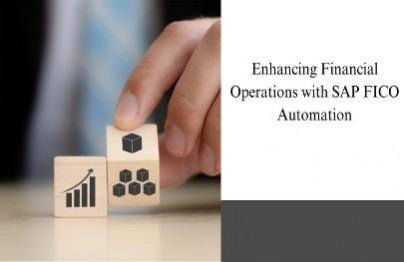
In the evolving landscape of financial management, automation is proving to be a game-changer, particularly in enterprise resource planning. Rajasekhara Reddy Syamagari, an expert in financial automation, explores the impact of integrating automation solutions into SAP FICO environments. His research highlights how businesses can optimize financial processes, enhance compliance, and streamline reconciliation with intelligent automation.
The Transformation of Financial Reconciliation
Automating SAP FICO reconciliation eliminates manual inefficiencies, reducing errors and delays in financial reporting. With over 99.5% first-time match accuracy, automated systems process thousands of transactions per hour, minimizing manual intervention and enabling real-time financial monitoring for improved accuracy and efficiency.
Intelligent Mapping and Accuracy Enhancement
SAP FICO automation leverages intelligent mapping algorithms for enhanced data accuracy in high-volume transactions. Integrating machine learning, it improves transaction matching accuracy by 91.2% and reduces processing time by 68.5%, streamlining reconciliation across financial sources and boosting operational efficiency.
Process Optimization through AI-Powered Automation
AI-driven automation in SAP FICO optimizes financial workflows, reducing manual effort in journal entries, invoice processing, and tax compliance. Businesses see a 42.3% faster closing cycle and 99.9% accuracy in posting validations, ensuring structured, error-free financial reporting and efficiency.
Reducing Compliance Risks and Audit Challenges
Automation in SAP FICO not only streamlines operations but also plays a crucial role in compliance management. Organizations adopting automated compliance frameworks report a 56.7% reduction in audit findings and a 73.2% decrease in reporting errors. Systematic compliance checks through automated validation rules ensure adherence to financial regulations, reducing the risk of penalties and legal discrepancies. Additionally, automation enables businesses to maintain detailed audit trails, improving transparency in financial operations.
Improving Resource Allocation and Decision-Making
With the integration of automation in SAP FICO, organizations can reallocate financial resources more strategically. Automated reconciliation and reporting processes allow finance teams to focus on analytical tasks rather than manual data entry. The improved efficiency enables businesses to reduce time spent on routine reconciliation by 73.5%, allowing professionals to engage in higher-value financial planning and forecasting activities.
The Impact on Accounts Payable and Receivable Management
Financial automation has shown significant benefits in accounts payable and receivable management. Automated systems have reduced payment errors by 44.9% while improving collection efficiency by 58.3%. Organizations have also reported a 39.7% reduction in dispute resolution timeframes. The seamless automation of these processes results in improved cash flow management and stronger financial stability.
Real-Time Financial Insights with Predictive Analytics
The future of financial automation lies in predictive analytics. Organizations leveraging AI and machine learning for financial forecasting have witnessed an 88.6% improvement in forecasting accuracy. By analyzing real-time transaction data, businesses can anticipate financial risks, optimize cash flow, and make data-driven decisions with greater precision. AI-powered analytics enhance decision-making capabilities, leading to more proactive financial management.
The Road Ahead: Expanding Automation Capabilities
As financial automation continues to evolve, businesses are increasingly adopting AI-driven solutions to further enhance operational efficiency. By 2026, over 67% of SAP FICO implementations are expected to incorporate advanced AI capabilities. Emerging technologies such as real-time analytics and machine learning-based anomaly detection will continue to shape the future of financial operations. Organizations investing in automation will gain a competitive edge by reducing operational costs, improving reporting accuracy, and ensuring regulatory compliance.
The implementation of automation in SAP FICO environments is transforming financial operations, enabling businesses to achieve higher efficiency, accuracy, and compliance. Rajasekhara Reddy Syamagari's insights underscore the immense value of intelligent automation in financial reconciliation, resource allocation, and predictive analytics. As automation technologies advance, organizations have a unique opportunity to enhance their financial operations and drive long-term success through streamlined and intelligent financial workflows.

















